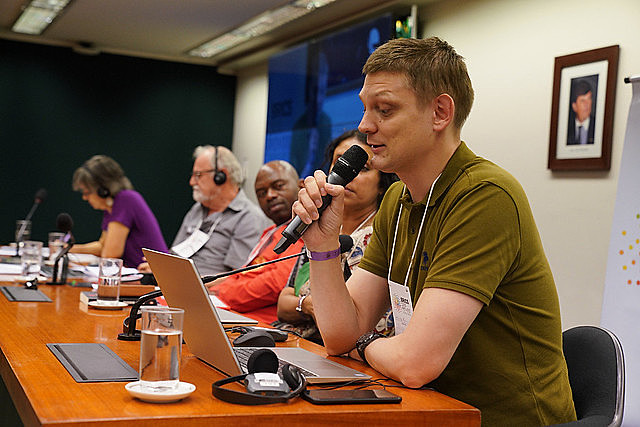After discussing about the current international political scenario, the Peoples’ BRICS Summit on Tuesday afternoon looked into the need to carry out joint social struggles on a global scale.
The panelists discussed Challenges of Internationalism, Solidarity and the Integration of Peoples during the last debate of the two-day meeting held in Brasília, the capital of Brazil, in the same week when the BRICS Summit will take place.
S'bu Zikode, of the South African shack dwellers movement Abahlali baseMjondolo, pointed out that political solidarity can be a way out of the isolation that people’s organizations that are not linked with governments or States face, underscoring that not only sharing experiences is needed, but also organizing the struggles together.
“Internationalism is likely to succeed when we can practically connect our struggles nationally, regionally, and internationally. We must share programs of action,” the shack dwellers activist said. “We must develop systemic solidarity mechanisms.”
Bhasha Singh, a journalist with the Safai Karmashari Andolan, a movement that aims to eradicate manual scavenging from India, said that integrating the struggles is necessary because the opposers of people’s organizations already do that among themselves.
Singh spoke about the struggle in India against scavenging, a labor imposed to social segments regarded as “inferior.” In her opinion, the racially-motivated discrimination these populations face in her country also happen in different ways in other countries.
“In our times, the fascists rulers across the globe are united. They come for each other’s help,” she adds. “The leaders are united against their own people,” the journalist points out, adding that, nevertheless, “this is a great opportunity for Peoples’ BRICS also, to consolidate on the other side.” “We, the people of the BRICS, we the people of the globe, who are putting on a challenge for these leaders.”
The Indian journalist also pointed out that having discussions between movements is needed to forge more institutional forms of international socialist integration, with different formats of organization taking part in it.
A member of the Russian Communist Workers’ Party, Aleksandr Mironov spoke about the rise of the right around the globe, arguing that overcoming capitalism itself is necessary in order to overcome the far right.
“Fascism is a radical form of dictatorship of big capital. Fascism is a constant byproduct of capitalism, which serves as a tool to suppress the popular movement. As long as capitalism exists, fascism will reappear,” he said.
Mironov said that there is people’s organizations lack more “strategic unity” internationally. In his view, one of the tasks of the left is to balance the diversity of perspectives with the need for more concrete, joint actions.
“I understand that not all movements serve the people’s vital interests. What we need is clear criteria that will allow to separate true representatives of the people from others,” he proposed.
The Brazilian feminist Nalu Faria, of the World March of Women, argued that it is imperative, in this sense, to forge a model based on majorities, without disregarding the specific aspects of these broad compositions.
“Any action which is based on anti-imperialism has to connect this dimension with the aspirations of the majority of the population. We have to incorporate the struggles of the youth, of black people, of indigenous people, of women. Not as a list of demands, but as a project that can break all forms of oppression and exploitation,” she underscored.
By the end of the discussion, the participants read a statement summarizing the discussions and proposals and handed it to Brazilian members of Congress. The document will be submitted to the embassies of the other countries that are members of the BRICS — Russia, India, China, and South Africa.




